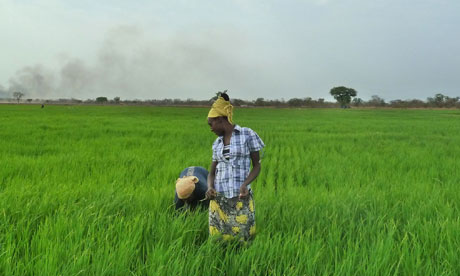
Photograph: Jenny Vaughan/AFP/Getty Images
As seen on the Guardian
It's not a touchdown – to use an American football analogy – but the good news is that the G8 has definitely scored a first down on land.
How so? In their communiqué from Lough Erne” the leaders of the G8 moved forward one of the development community's most challenging “balls”: securing the land rights of people around the world.
Progress in this particular area has been challenging in part because it is so politically fraught. Control of land (and the valuable resources located on and under it) empowers” and few wish to relinquish this control once they have acquired it. Such power dynamics help explain why marginalised communities and women have an especially tough time gaining and maintaining formal rights to land.
Money is another reason why extending land rights has been a challenge. Systematic land registration projects can cost hundreds of millions of dollars. Given economic realities” few official donors are in a position to underwrite these kinds of projects.
In light of these constraints” it is significant that G8 leaders have nonetheless committed to supporting efforts to bring more transparency to land transactions and to improve land governance by working with a variety of stakeholders. Looking for cost-effective” innovative approaches that secure land rights is imperative” and the G8's pledge to help implement the voluntary guidelines on the responsible governance of tenure can help identify such approaches by supporting more active” direct engagement with communities to recognize and record rights.
Despite the challenges” improving land governance is a smart investment for G8 countries. As the communiqué notes with regard to natural resources writ large: “[they] have the potential” if developed and managed responsibly” in line with internationally recognised environmental and social standards” to be a key driver of strong and sustainable growth” especially in developing countries with an abundance of 'natural resources'.”
Securing land and resource rights can make communities more resilient by providing them with the sound basis they need to build businesses” enter value chains” and pursue a host of entrepreneurial opportunities.
Consider what local conservancies in Namibia have already done with stronger” clearer rights to regulate and benefit from the use of wildlife and other natural resources on communal lands. They have established joint venture tourism lodges along with other amenities and services that generate millions of dollars of revenue at the community level.
Now” consider what smallholder farmers might do with clearer rights to their increasingly valuable lands: they might lease farmlands” local forests” or pastures directly to commercial agriculture or forestry operators or processors to generate the revenue that would support a more vibrant rural economy. Today” in far too many countries” this leasing option doesn't exist” and communities cannot directly trade rights in land.
Improving land governance and transparency is also a smart investment because it reduces the human and economic costs of land-based conflict. Around the world” such conflict costs lives and threatens to limit economic growth. To take just one example” in Cambodia clashes over opaque land transactions are fueling civil unrest. The Cambodian government is accused of human rights violations for its treatment of land rights' activists” and a recent UN report found that government concessions of land are not only failing to deliver promised economic growth but also increasing the reputational risk to private sector investors. Similar concerns exist across South and South East Asia” sub-Saharan Africa” and” to a lesser extent” Latin America.
Clearly” much needs to be done to reduce land-related risks on the ground” and the G8 cannot tackle this challenge alone. Other stakeholders” notably developing world governments” the private sector” and civil society all have vitally important roles to play to improve the transparency and governance with regard to global land rights. Still” the G8's stated commitment to securing these rights adds vital momentum to on-going efforts to limit harmful land transactions.
As with most announcements of this nature” the devil will” of course” be in the details. Most pressing among these details is the question of how much capital the G8 is willing to devote to land rights initiatives—both political capital to foster meaningful changes in behavior and financial capital” including technical assistance. This investment on the part of the G8 remains unclear.
So” is the ball on land rights in the end zone? By no means” but the G8's willingness to tackle this tough policy area is a welcome step forward.
